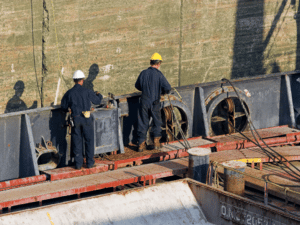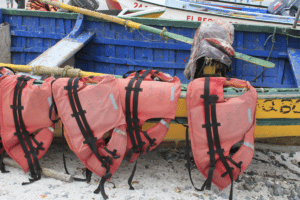Many maritime workers are injured each year due to defective maritime products. Defective maritime products are any products or machinery that have broken or malfunctioning parts. If these parts contribute to the injury of maritime workers, laws are set into place to protect them.

Maritime Product Liability
General maritime law recognizes the defective products are a valid liability claim under East River S.S. Corp. v. Transamerica De laval, 476 U.S. 858,106 S. Ct. 2295. However, in order for a maritime defective product claim to be valid, the injury must have happened on navigable water. Navigable water means that the vessel is out to sea when the injury occurred, yet it can also mean any vessel that’s docked, but still in navigable waters and capable of navigation.
In addition, the products must meet the definition of defective as described by general maritime law. A product is considered defective if it has serious flaws in the:
- Design
- Construction
- Composition
A product can also be considered defective if there was not adequate label warnings provided before use. For example, if the product poses a significant injury risk if protective gear isn’t worn, yet the product did not clearly state this, it may be considered defective.
Examples of Defective Maritime Products
The maritime industry covers a wide array of services, including commercial fishing, loading and unloading cargo, vessel building and repairs, electrical work, and much more. Therefore, the amount of products used in maritime work is extremely large, and in many instances, even one small defect can result in life-threatening injuries. For instance, if a crane’s bundle strap is defective, it may break, resulting in the bundle falling and striking anyone in the vicinity. Other common defective maritime parts include:
- Conveyor belts
- Fishing nets
- Engines
- Generators
- Fuel tanks
- Electronics
- Safety equipment

Who is Liable for Defective Maritime Parts?
Under general maritime law, the manufacturers of the defective products are typically responsible when an injury results. If employers fail to inspect equipment and keep their employees safe within reason, they may be liable as well. For example, employers have the legal obligation to ensure seaman are working aboard a seaworthy vessel. If an employee finds a defect in the vessel yet doesn’t have it repaired, the employee may be liable for any accidents and injuries.
Legal Resources for Defective Maritime Products
Defective maritime products can often be hard to prove. In some instances, defective parts were sold by service providers and not directly from the manufacturer. These service providers will use this as an excuse to get out of liability, claiming they are not at fault. However, product liability law states that the product doesn’t have to be directly purchased by the manufacturer in order to be considered for a defective product lawsuit. In other situations, manufacturers will try to put the blame on the maritime worker.
These defense tactics can make the process difficult for maritime workers, but keep in mind that if you’ve been injured because of a defective product, you have legal rights to protect you regardless of the defense schemes used against you. For more information and to protect your legal options, consult with an experienced maritime accident attorney who will help not only help you prove your case, but will also help dispel common defense tactics.